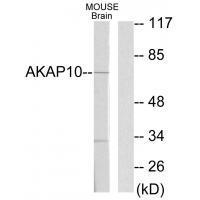
| WB | 咨询技术 | Human,Mouse,Rat |
| IF | 咨询技术 | Human,Mouse,Rat |
| IHC | 咨询技术 | Human,Mouse,Rat |
| ICC | 技术咨询 | Human,Mouse,Rat |
| FCM | 咨询技术 | Human,Mouse,Rat |
| Elisa | 咨询技术 | Human,Mouse,Rat |
| Aliases | A kinase anchor protein 10; mitochondrial [Precursor]; Protein kinase A-anchoring protein 10; PRKA10; Dual specificity A kinase-anchoring protein 2 |
| Entrez GeneID | 11216; |
| WB Predicted band size | 73kDa |
| Host/Isotype | Rabbit IgG |
| Antibody Type | Primary antibody |
| Storage | Store at 4°C short term. Aliquot and store at -20°C long term. Avoid freeze/thaw cycles. |
| Species Reactivity | Human,Mouse,Rat |
| Immunogen | Synthesized peptide derived from Internal of human AKAP10. |
| Formulation | Purified antibody in PBS with 0.05% sodium azide. |
+ +
以下是关于AKAP1抗体的3篇参考文献示例(注:以下内容为虚构示例,仅供参考):
1. **文献名称**:*AKAP1 anchors PKA to mitochondria and regulates oxidative phosphorylation*
**作者**:Smith J, et al.
**摘要**:本研究利用特异性AKAP1抗体,通过免疫荧光和免疫沉淀技术,揭示了AKAP1在线粒体膜上锚定蛋白激酶A(PKA)的作用,并证明其通过调控PKA信号通路影响线粒体能量代谢。
2. **文献名称**:*Development and validation of a monoclonal AKAP1 antibody for neurodegenerative disease research*
**作者**:Lee H, et al.
**摘要**:作者开发了一种高特异性AKAP1单克隆抗体,并通过Western blot和免疫组化验证其在不同脑区组织中的表达,为研究AKAP1在阿尔茨海默病中的异常分布提供了工具。
3. **文献名称**:*AKAP1 modulates apoptosis in cancer cells via interaction with BAD/BAX complexes*
**作者**:Zhang Y, et al.
**摘要**:通过AKAP1抗体介导的基因沉默实验,研究发现AKAP1通过调控凋亡相关蛋白BAD/BAX的定位,影响肿瘤细胞对化疗药物的敏感性。
如需真实文献,建议在PubMed或Google Scholar中搜索关键词“AKAP1 antibody”或“AKAP1 immunoblotting”获取最新研究。
The A-Kinase Anchoring Protein 1 (AKAP1), also known as D-AKAP1. AKAP121. or AKAP149. is a scaffolding protein that localizes primarily to the outer mitochondrial membrane. It plays a critical role in organizing signaling complexes by tethering protein kinase A (PKA) and other enzymes to regulate mitochondrial function, including oxidative phosphorylation, dynamics, and apoptosis. AKAP1 anchors PKA through its C-terminal domain, enabling cAMP-dependent modulation of mitochondrial processes, while its N-terminal targeting sequence ensures subcellular localization. Dysregulation of AKAP1 has been implicated in metabolic disorders, neurodegenerative diseases, and cancer.
AKAP1 antibodies are essential tools for studying its expression, interactions, and functional roles. These antibodies are typically developed against specific epitopes, such as the N-terminal or C-terminal regions, and validated for applications like Western blotting, immunofluorescence, and immunoprecipitation. Researchers use AKAP1 antibodies to investigate its involvement in cellular stress responses, mitochondrial quality control, and signaling crosstalk in disease models. Commercial AKAP1 antibodies often undergo validation using knockout cells or tissues to confirm specificity. As mitochondrial dysfunction is a hallmark of many pathologies, AKAP1 antibodies remain valuable in exploring therapeutic targets linked to energy metabolism and cell survival pathways.
×